BMW i7 VS Hyundai IONIQ 6 – Specs, Efficiency & Price Comparison
Which model is the better choice – the BMW i7 or the Hyundai IONIQ 6? We compare performance (659 HP vs 325 HP), boot capacity (500 L vs 401 L), efficiency (18.50 kWh vs 13.90 kWh), and of course, the price (99200 £ vs 37600 £).
Find out now which car fits your needs better!
The BMW i7 (Sedan) is powered by a Electric engine and comes with a Automatic transmission. In comparison, the Hyundai IONIQ 6 (Hatchback) features a Electric engine and a Automatic gearbox.
When it comes to boot capacity, the BMW i7 offers 500 L, while the Hyundai IONIQ 6 provides 401 L – depending on what matters most to you. If you’re looking for more power, you’ll need to decide whether the 659 HP of the BMW i7 or the 325 HP of the Hyundai IONIQ 6 suits your needs better.
There are also differences in efficiency: 18.50 kWh vs 13.90 kWh. In terms of price, the BMW i7 starts at 99200 £, while the Hyundai IONIQ 6 is available from 37600 £.
Compare all the key specs now and find out which model fits your lifestyle best!
BMW i7
The new BMW i7 epitomises luxury and innovation, seamlessly blending advanced technology with elegant design. Its interior offers an unparalleled experience, with premium materials and cutting-edge features that create a tranquil yet engaging atmosphere for both driver and passengers. The i7's performance is both dynamic and efficient, demonstrating BMW's commitment to sustainable driving without compromising on the exhilarating drive the brand is known for.
details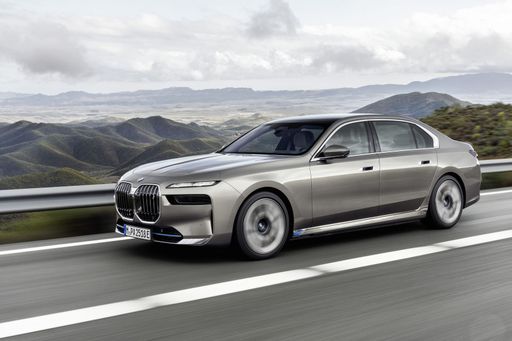 @ press.bmwgroup.com
@ press.bmwgroup.com
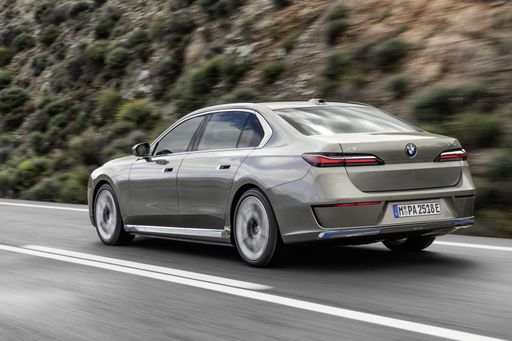 @ press.bmwgroup.com
@ press.bmwgroup.com
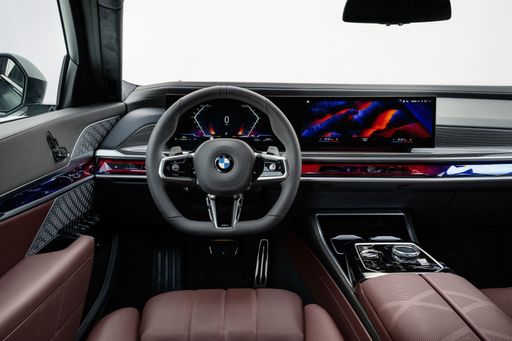 @ press.bmwgroup.com
@ press.bmwgroup.com
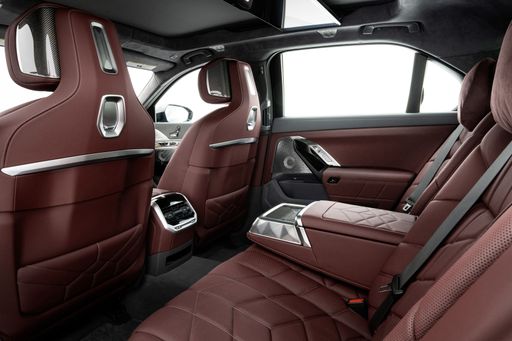 @ press.bmwgroup.com
@ press.bmwgroup.com
Hyundai IONIQ 6
The Hyundai IONIQ 6 merges futuristic design with eco-friendly technology, offering a glimpse into the future of electric mobility. Its sleek silhouette and aerodynamic profile are sure to capture attention on the road, while the interior provides a seamless blend of comfort and cutting-edge digital features. With a focus on efficiency and sustainability, this model represents a significant step forward in the evolution of electric vehicles.
details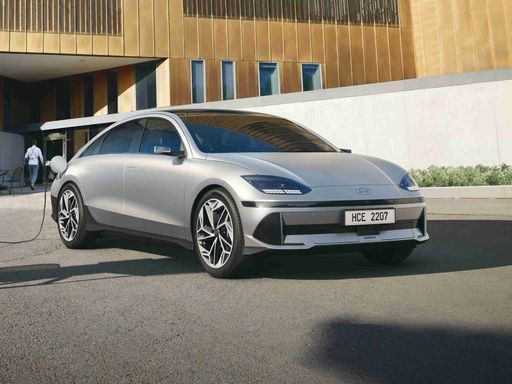 @ hyundai.news
@ hyundai.news
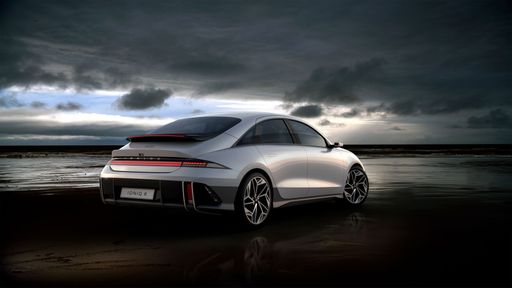 @ hyundai.news
@ hyundai.news
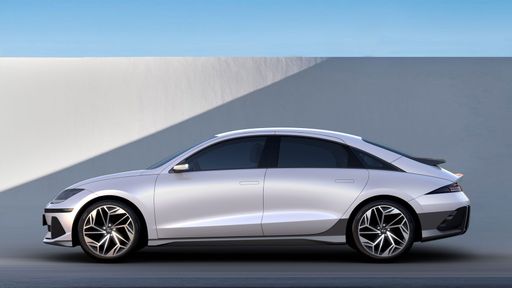 @ hyundai.news
@ hyundai.news
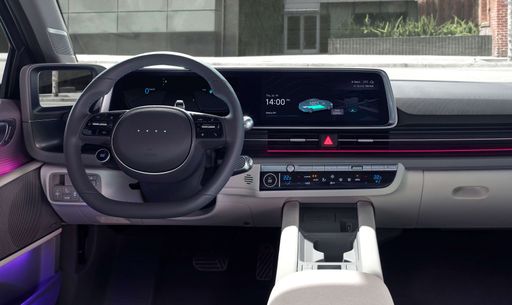 @ hyundai.news
@ hyundai.news

|

|
|
|
|
Costs and Consumption |
|
|---|---|
|
Price
99200 - 157000 £
|
Price
37600 - 55000 £
|
|
Consumption L/100km
-
|
Consumption L/100km
-
|
|
Consumption kWh/100km
18.5 - 20.8 kWh
|
Consumption kWh/100km
13.9 - 15.1 kWh
|
|
Electric Range
559 - 624 km
|
Electric Range
429 - 614 km
|
|
Battery Capacity
101.70 kWh
|
Battery Capacity
53 - 77.4 kWh
|
|
co2
0 g/km
|
co2
0 g/km
|
|
Fuel tank capacity
-
|
Fuel tank capacity
-
|
Dimensions and Body |
|
|---|---|
|
Body Type
Sedan
|
Body Type
Hatchback
|
|
Seats
5
|
Seats
5
|
|
Doors
4
|
Doors
4
|
|
Curb weight
2595 - 2770 kg
|
Curb weight
1850 - 2095 kg
|
|
Trunk capacity
500 L
|
Trunk capacity
401 L
|
|
Length
5391 mm
|
Length
4855 mm
|
|
Width
1950 mm
|
Width
1880 mm
|
|
Height
1544 mm
|
Height
1495 mm
|
|
Payload
480 - 535 kg
|
Payload
425 - 430 kg
|
Engine and Performance |
|
|---|---|
|
Engine Type
Electric
|
Engine Type
Electric
|
|
Transmission
Automatic
|
Transmission
Automatic
|
|
Transmission Detail
-
|
Transmission Detail
-
|
|
Drive Type
Rear-Wheel Drive, All-Wheel Drive
|
Drive Type
Rear-Wheel Drive, All-Wheel Drive
|
|
Power HP
455 - 659 HP
|
Power HP
151 - 325 HP
|
|
Acceleration 0-100km/h
3.7 - 5.5 s
|
Acceleration 0-100km/h
5.1 - 8.8 s
|
|
Max Speed
205 - 250 km/h
|
Max Speed
185 km/h
|
|
Torque
650 - 1100 Nm
|
Torque
350 - 605 Nm
|
|
Number of Cylinders
-
|
Number of Cylinders
-
|
|
Power kW
335 - 485 kW
|
Power kW
111 - 239 kW
|
|
Engine capacity
-
|
Engine capacity
-
|
General |
|
|---|---|
|
Model Year
2022 - 2023
|
Model Year
2022
|
|
CO2 Efficiency Class
A
|
CO2 Efficiency Class
A
|
|
Brand
BMW
|
Brand
Hyundai
|
BMW i7
The Pinnacle of Electric Luxury: BMW i7
Introducing the BMW i7, the latest in electric innovation from one of the world's premier automobile manufacturers. Blending cutting-edge technology with luxurious comfort, the i7 represents a significant leap forward in the electric vehicle (EV) market. This article delves into the technical specifications and innovative features that set the BMW i7 apart from its competitors.
Powerful Electric Performance
Under the sleek exterior of the BMW i7 lies a powerhouse of electric capabilities. Depending on the model configuration, the i7 offers between 455 and 660 PS, with a torque of up to 1100 Nm. This ensures an exhilarating driving experience, whether you choose the rear-wheel drive or all-wheel drive configuration. The acceleration is equally impressive, with the i7 capable of going from 0 to 100 km/h in just 3.7 to 5.5 seconds.
Efficient Energy Consumption
The efficiency of the BMW i7 is noteworthy, with an energy consumption ranging from 18.5 to 20.8 kWh/100 km. This efficiency, combined with a substantial battery capacity of 101.7 kWh, gives the i7 an electric range of between 559 and 623 kilometres. BMW’s commitment to sustainability is further underscored by its zero CO2 emissions, reinforcing its status as a premium yet environmentally conscious choice.
Sophisticated Interior and Technology
Inside, the BMW i7 is the epitome of luxury. With seating for five, the interior exudes elegance and comfort. Advanced technology is at your fingertips with features such as the latest iDrive system, providing seamless connectivity and enhanced control over vehicle functions. The i7 ensures you travel in style with its sophisticated Design Pure Excellence, M Sport package, and M Sport package Pro interior trims.
Dimensions and Capacity
The i7’s ample dimensions – with a length of 5391 mm, width of 1950 mm, and height of 1544 mm – are matched by its generous luggage capacity of 500 litres, ensuring practicality alongside luxury. The car's robust build is complemented by a payload capacity of between 480 to 535 kg, ensuring the i7 is as functional as it is stylish.
Cost and Efficiency
With prices ranging from €115,700 to €181,800, the i7 is positioned as a high-end vehicle offering value through its advanced features and performance. The monthly operating costs range between €2,143 and €3,027, while the cost per kilometre is approximately 85.7 to 121.1 cents. Despite its upscale market positioning, the i7 offers competitive efficiency with its remarkable CO2 emission-free driving and energy-saving technologies.
Conclusion
The BMW i7 stands as a testament to the brand’s innovation and dedication to sustainable luxury. By marrying performance, efficiency, and cutting-edge technology, BMW has ensured that the i7 not only meets but exceeds the expectations of discerning EV enthusiasts. The i7 is not merely a car; it is a statement of intent in the future of sustainable luxury. Experience the future today with the BMW i7.
Hyundai IONIQ 6
Introducing the Hyundai IONIQ 6: A New Era of Electric Mobility
The Hyundai IONIQ 6 is more than just a car; it's a glimpse into the future of electric mobility. With cutting-edge technology, impressive performance, and a sustainable design, this vehicle stands as a beacon for the automotive industry's electric revolution. Let's delve into what makes the IONIQ 6 a standout choice in the rapidly growing electric vehicle market.
Performance and Power: The Heart of the IONIQ 6
The Hyundai IONIQ 6 offers two battery options – a 53 kWh version and a more powerful 77.4 kWh variant. Depending on the configuration, drivers can experience a power output ranging from 151 PS to a remarkable 325 PS, highlighting the versatility of this model. With a maximum torque of up to 605 Nm, acceleration from 0-100 km/h is achieved in just 5.1 to 8.8 seconds, catering to both efficiency enthusiasts and those with a penchant for speed.
Efficiency and Range: Long Journeys Made Easy
One of the IONIQ 6's standout features is its exceptional range. Offering an electric range between 429 km to an impressive 614 km on a single charge, it's designed to go the distance. Efficiency is at the forefront, with energy consumption between 13.9 kWh/100km and 15.1 kWh/100km, ensuring that your driving experience remains as eco-friendly as it is enjoyable. All variants boast a CO2 efficiency class of A, reflecting Hyundai's commitment to sustainability.
Design and Interior: Luxury Meets Sustainability
The IONIQ 6's sleek, aerodynamic design is not only visually stunning but also functional, reducing air resistance to maximise efficiency. Offering a hatchback style, it comfortably seats five, ensuring ample space for passengers and luggage. The interior is crafted with sustainable materials, combining advanced technology with an eco-conscious ethos. With a boot capacity of 401 litres, it seamlessly balances practicality with style.
Technology and Innovation: Driving into the Future
Packed with the latest automotive technologies, the IONIQ 6 integrates the future of driving with present-day conveniences. It features a state-of-the-art automatic transmission with a reduction gearbox that ensures smooth driving dynamics. Its advanced driver assistance and safety systems provide peace of mind on every journey, making it an ideal choice for progressive drivers who embrace technology.
Conclusion: A Competitively Priced Electric Option
The Hyundai IONIQ 6 offers an enticing blend of performance, range, and sustainability. With prices ranging from €43,900 to €64,200, it represents excellent value for an electric vehicle of its calibre. Monthly costs are competitively set between €1066 to €1379, while cost per km ranges between 42.7 to 55.2 cents, appealing to cost-conscious customers without compromising on quality or innovation. The IONIQ 6 is a triumph of modern engineering, making it a strong contender in the electric vehicle market.
The prices and data displayed are estimates based on German list prices and may vary by country. This information is not legally binding.
